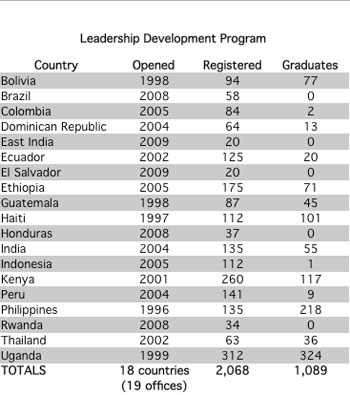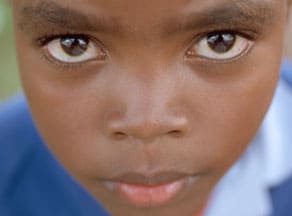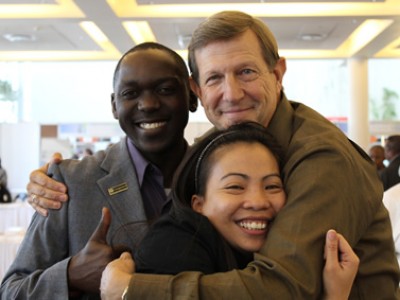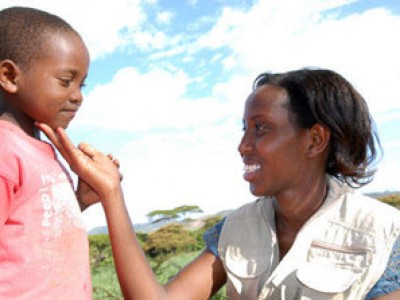People Living With HIV or AIDS
Sitting in the humid air inside a tent, listening to the palm leaves sway and the support poles creak, and with her hand clasped on her cheek, Zainabu can still hear the words ringing in her head:
“You have been tested positive for human immunodeficiency virus (HIV), the micro-organism that causes the acquired immunodeficiency syndrome (AIDS).”
When the doctor announced the results, a mood of gloom and despair descended on Zainabu. She did not know where to go or what to do.
“It seemed like my life and the livelihood of my children had been cut, since they all depended on me.”
Looking for a shoulder to cry on, Zainabu wondered whom to inform or talk to. Her family and the community had no place for HIV-positive people. “I am an abomination,” Zainabu thought to herself.
Continue Reading ›Crowned With Abundancy
The Leadership Development Program* (LDP), which began in 1996, recently achieved a significant milestone, its 1,000th graduate.
Joanita Nannyunja completed a bachelor of science degree in agriculture at Makerere University in Kampala. Makerere University is Uganda’s oldest and most prestigious institute of higher learning.

*This content honors our historical Leadership Development Program. To learn more about our current youth development opportunities, click here.
Continue Reading ›Chasing Off the Leopard of Hunger in Uganda
In July 2009, a cry for help went up in parts of northern and eastern Uganda as many people succumbed to the severe and persistent drought that swept across half of the nation. Soroti district was one of the localities that was hardest hit. However, this cry was not new to this part of the country.
Every year Soroti district is listed as a statistic for emergency help. It is said to be one of the districts with the highest levels of poverty in the country, with a very low education level and inhabitants ignorant of cultivation skills. Many have painful memories of war.
With unpredictable weather, from hot and dry conditions that lead to drought and famine, to strong winds and rain that destroy homes and crops, the inhabitants of the land never know what to expect of fickle nature and how to overcome the damage left behind.
To the local inhabitants, the hunger and famine that come with the changing seasons is a leopard looking for the helpless and hopeless to devour. But for a few people in the community, it is time to fight back.
For the beneficiaries of the Asuret and Victory Outreach Orwadai Child Development Centers, it is time to hunt down and chase the “leopard,” and banish it for good.
Risks Remain Large for Kenyan Children
While the East African nation of Kenya does not grab as many headlines as its less stable neighbors to the west, disease, malnourishment and violence are leaving a mark on this generation of Kenyan children.
 About 500,000 Kenyan children are missing school due to lack of food.
About 500,000 Kenyan children are missing school due to lack of food.
According to the World Food Program, in countries where school attendance is low, the promise of at least one nutritious meal each day boosts enrollment and promotes regular attendance. Where that is not offered, hunger interferes with the children’s concentration in class, affecting class performance. As famine takes its toll across the country, a growing number of students are staying away from school altogether to help their parents look for food (The Standard, Sept. 23, 2009).
Drought and famine have led to an increase in the high school dropout rate primarily in schools in the Njoro and Nakuru areas. While 29 percent of children in Nairobi are malnourished, that number increases to 42 percent in the Eastern Province (Daily Nation, Oct. 7, 2009).
The United Nations Scientific and Cultural Organization (UNESCO) has stated that malnutrition is the major barrier to universal primary education in Kenya.
Famine conditions have also affected livestock in the rural areas of Kenya, undermining the primary source of income for pastoralists, especially the Maasai population. (more…)

Letter Writing Ideas From the Moody Bible Institute Scholars
Four Leadership Development Program graduates now attending Moody Bible Institute share some tips on what you should include in the letters you write to your sponsored children.
Living in Two Worlds
How difficult is it for the Moody scholars to transition between the poverty of their homes and life in the U.S.?

Child Sponsorship Is Not in Vain
My name is Peninah Esianoi Pashile. I was a sponsored child at Imaroro Child Develoment Center in Kenya. I would like to share my story with you and hope that it will be an inspiration and encouragement.
What’s It Like Growing Up in Poverty?
Another clip from our video interview with the Moody Bible Institute scholars.
After watching it, will you sponsor a Leadership Development Program student? You can do so by yourself, but you can also do it as a group, with family, friends, co-workers, your small group, etc.
Who’s in Charge?
So, an emperor, a chief and a queen are all in a room together. The emperor is from Uganda. The chief is from the Dominican Republic. And the queen is from the Philippines. Who’s in charge?
Bringing Joy: My Best Day in Ministry
Kenneth Kataryeba, a learning and support specialist for East Africa, shares the story of a girl in a wheelchair whom he just met, and how bringing joy to children and helping lift them from the misery of poverty is how he really gets paid.
God’s Agents of Change: Unscripted
In late July we interviewed our Moody Bible Institute scholarship recipients using questions you submitted here. We filmed the interview and will be sharing clips from the session with you over the next few weeks.
In the first clip, which is just over 13 minutes long, you’ll get to see how Richmond, Tony, Michelle and Jimmy interact with one another.
You’ll get a taste of the strength of their relationships with one another and with God.
And you’ll get a little insight into what Jimmy probably asked his sponsor when they met at Catalyst 2009.
Beyond getting to know them a little better, by learning what these agents of change are studying at Moody and why they chose their fields of study, you’ll also hear, among other things:
- Tony speak about his call to serve teenagers
- Michelle and Richmond share about their desires to develop strong Christian leaders in the Philippines and Uganda
- Jimmy relate what life was like before he was sponsored
Enjoy.
Catalyst 2009: It Could Have Been Me
Catalyst 2009 – When I watch the video, I see that this could have been me in different circumstances. I see that this can be my sponsored child.


